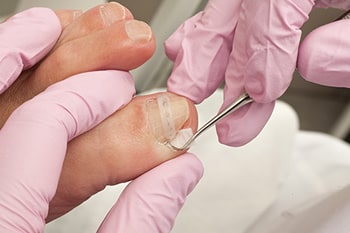
What is an Ingrown Toenail?
Ingrown toenails can affect all age groups, and occur as the corner of the nail starts to grow downward into the skin. This can be an extremely painful condition to those individuals with an active lifestyle. The condition can be mild to quite severe, and ingrown toenail removal may or may not be indicated.
When Should You Go to the Doctor for an Ingrown Toenail?
You should schedule a visit to see a Podiatrist if you notice increased pain with pressure on the toenail. Swelling and redness are signs of an infection, and may be accompanied by drainage. If left untreated this infection can spread to the bones of the toe. Treatment of an ingrown toenail is even more critical if you are diabetic.
How Do We Fix Ingrown Toenails?
Ingrown nails may be treated in a variety of ways depending on the severity at the time of your visit. In mild cases the nails may simply need to be trimmed and the patient educated on preventative care. In more serious cases, the portion of the toenail which is ingrown will be removed.
How Painful is Ingrown Toenail Removal?Your toe will be anesthetized and we try to accomplish the removal without giving multiple injections. Although the injection can be the most uncomfortable part of the procedure, we numb the injection site prior to the injection with a topical anesthetic spray significantly minimizing this discomfort. Once this is done, removal of the ingrown toenail is painless. Once removed, you will have the option to have the procedure made permanent by cauterization of the nail matrix. This procedure will potentially prevent the ingrown nail from recurring.
What is Our Toenail Removal Aftercare?
After the procedure, patients are advised on care for the toe, beginning either later that afternoon or the following day. Patients are prescribed an antibiotic and are seen within a week for follow-up.
To learn more about ingrown toenail removal or treatment, call us at (706) 310-4288 or request appointment online Dr. Gowdie at the Foot and Ankle Treatment Center.
